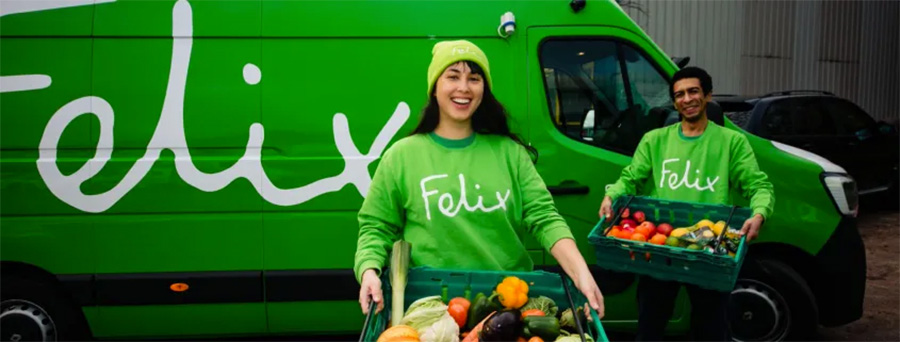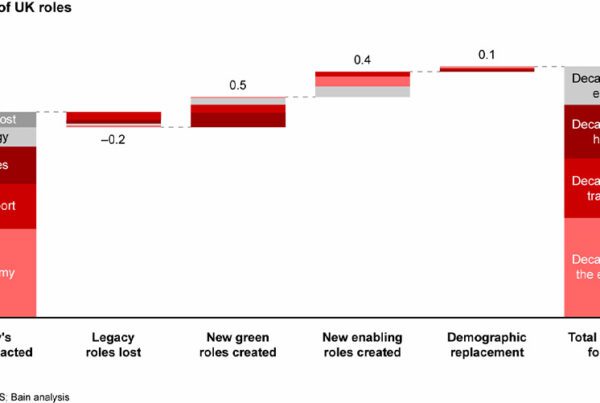With the cost-of-living crisis making it harder for households to make ends meet, the role of food charities has become increasingly important across the UK. Consulting firm North Highland recently worked to help UK food redistribution charity The Felix Project scale across London.
The Felix Project is a UK charitable organisation that saves surplus food from suppliers and redistributes it to charities – with a dual aim of feeding people, and helping to reduce food surplus. A relatively young charity, The Felix Project experienced a meteoric rise in demand for its services during the Covid-19 pandemic. Prior to the lockdown period, many communities were already experiencing a food poverty crisis, but the situation deepened amid the coronavirus outbreak – and has further deepened even after lockdown.
Record rates of inflation have left a growing number of UK households struggling to heat their homes and eat healthily – meaning demand for food charities has exploded. Amid that, The Felix Project has found itself swamped; leading to employee burnout and attrition, while bosses have found it hard to invest time and or money in people development – hampered by corporate partnerships that were reactive, inconsistent, and time-intensive.

As it sought to scale its operations to sustainably meet the needs of hungry people across London, The Felix Project engaged consultants from North Highland to achieve two key priorities. It hoped to gain a detailed understanding of the end-to-end process and activities involved with corporate partnerships to enable the design, pilot, and launch of a new corporate partnership model to increase effectiveness and scalability. And it needed a series of “train-the-trainer”-style sessions to be designed and delivered, which could help upskill leaders in key management competencies, and increase employee engagement through a renewed focus on people development.
A release from North Highland on the consultancy’s website outlined the approach the professionals took, to help realise those goals. First, this saw the consultants map out the organisation’s current state by taking a collaborative approach to unpacking and addressing the challenges and pain points The Felix Project faced with its corporate partnerships.
The process
Once the consultants had this information, they then conducted a design-thinking-style ideation session, articulating our problem statement and exploring a wide range of potential partnership model designs, before working with the client to refine and prioritise those ideas and collaboratively design a proposed solution North Highland named ‘The Corporate Green Scheme.’
To ensure the effectiveness of the changes, North Highland sought to test variables and ensure that the solution would deliver the desired results for The Felix Project. Conducting a Corporate Green Scheme Pilot internally at North Highland, the firm was able to efficiently gather first-hand feedback and refine its approach, before developing an interactive corporate volunteering toolkit, leveraging insights from the charity’s team and our North Highland pilot participants to ensure ease of implementation, scalability, and repeatability for The Felix Project.
Then, to design and deliver the leadership training series, North Highland conducted discovery sessions to understand the key knowledge gaps within the leadership team and gain a clear understanding of the competencies we needed to target through training. The company then worked collaboratively with the client to iteratively design the training materials, incorporating best practices and industry insights while using practical scenarios for role-play activities. Delivering the training across a series of bite-sized learning sessions, culminating in an in-person session, managers and leaders had an additional opportunity for learning consolidation, practical implementation, and team building.
Results
North Highland produced practical deliverables that could easily be leveraged by the employees of The Felix Project. The company’s approach to the new corporate partnership model was designed with a focus on scaling the Green Scheme in particular, and by clearly outlining process, expectations, and roles and responsibilities, the clarity and consistency was achieved to make the new partnership approach highly repeatable. This has led to increased reliability and scalability, while reducing the high administrative and operational burden previously associated with coordinating corporate partnerships.
Through targeted training sessions, North Highland already helped to upskill more than 30 leaders in critical leadership skills, including leading through change, communicating with confidence, delivering effective feedback, and understanding team dynamics. The firm’s “train the trainer” approach enabled The Felix Project to continue developing its people without relying on consultants, and increase employee engagement in the long term.
Commenting on the results, Charlotte Hill, CEO of The Felix Project, said, “I have done a lot of training of this sort across my years as a CEO, and I can honestly say this was the best I have ever experienced. The work we do at The Felix Project can feel relentless at times, and especially during the pandemic and the cost-of-living crisis when the demand for our food is sadly so great. What North Highland has given us—both yesterday and across the many months we have worked together—is investment into the people without whom we simply wouldn’t do what we do. This impact will be felt for many years and months to come, for us each individually and for the organisation.”




